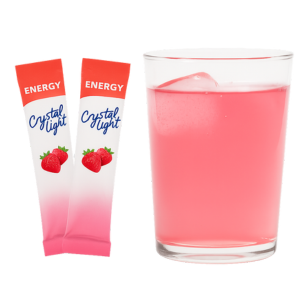
Crystal Light Energy
Caffeine
60 mg
Note: Caffeine amounts are based on standard preparation of one Crystal Light Energy packet mixed with 16.9 fl oz (500 ml) of water, which equals two 8 fl oz servings. Each serving provides 60 mg of caffeine. Actual caffeine content may vary slightly by flavor and preparation method.
| Attribute | Value |
|---|---|
| Caffeine Level | Moderate |
| Serving Size | 8 fl oz |
| Serving Size (ml) | 240 ml |
| Sugar | 0 g |
| Calories | 10 kcal |
| Caffeine per fl oz | 7.5 mg/fl oz |
Crystal Light Energy is a powdered drink mix designed for people who want a flavorful, low‑calorie beverage with an added energy boost. Unlike traditional energy drinks, it comes in small packets that you mix with water, making it portable and customizable.
What Is Crystal Light Energy?
Crystal Light Energy is part of the Crystal Light product line by Kraft Heinz, formulated to provide both hydration and a moderate caffeine lift. It’s sugar‑free, low in calories, and available in fruity flavors like Wild Strawberry, Grape, Peach Mango, and Citrus.
Key features include:
- Powdered drink mix format for on‑the‑go convenience
- Sugar‑free and only about 10 calories per serving
- Contains added caffeine for an energy boost
- Fortified with B‑vitamins for metabolism support
- Available in multiple fruity flavors
Together, these traits make Crystal Light Energy a lighter alternative to traditional energy drinks, appealing to those who want flavor and function without excess sugar.
How Much Caffeine Is in One Serving of Crystal Light Energy?
Caffeine is the main functional ingredient in Crystal Light Energy. Each serving is designed to provide a moderate boost without overwhelming the system.
Caffeine content per serving (8 fl oz):
- 60 mg of caffeine
- Equivalent to 3.75 mg per fluid ounce
- Moderate compared to coffee or energy drinks
This amount is enough to increase alertness and focus, but it’s lower than most canned energy drinks, making it a balanced option for everyday use.

Caffeine Content per Packet: Detailed Breakdown
Each Crystal Light Energy packet is intended to be mixed with a standard 16.9 fl oz (500 ml) bottle of water. The caffeine content remains consistent across flavors.
Per packet (16.9 fl oz prepared):
- 60 mg total caffeine
- 3.5–3.8 mg caffeine per fluid ounce
- Same caffeine level across Wild Strawberry, Grape, Peach Mango, and Citrus
In other words, a single packet delivers about the same caffeine as a small cup of tea, but less than a typical cup of coffee.
Crystal Light Energy vs Coffee, Tea, and Soda
To understand where Crystal Light Energy stands, it helps to compare it with other common caffeinated drinks.
Caffeine comparison (per 8 fl oz):
- Crystal Light Energy – 60 mg
- Brewed Coffee – 95–200 mg
- Black Tea – 40–70 mg
- Green Tea – 20–45 mg
- Cola Soda – 30–35 mg
- Red Bull (8.4 fl oz) – 80 mg
Crystal Light Energy falls in the moderate range, stronger than soda or green tea but weaker than coffee or most energy drinks.
Other Nutrition Facts: Calories, Sugar, and Ingredients
Beyond caffeine, Crystal Light Energy is designed to be a low‑calorie, sugar‑free option.
Nutrition per serving (8 fl oz prepared):
- Calories: ~10 kcal
- Sugar: 0 g
- Sodium: 35 mg
- Carbohydrates: <1 g
- Added B‑vitamins: Niacin, Vitamin B6, Vitamin B12, Pantothenic Acid
Key ingredients include:
- Citric acid and maltodextrin (base)
- Aspartame (sweetener)
- Caffeine
- Natural and artificial flavors
- B‑vitamins for energy metabolism
This makes it a functional drink that delivers caffeine and vitamins without the calorie or sugar load of typical energy drinks.
Is Crystal Light Energy Safe to Drink Daily?
For most healthy adults, Crystal Light Energy can be consumed safely in moderation. The FDA recommends a daily caffeine limit of up to 400 mg for adults.
Safety considerations:
- One packet = 60 mg caffeine
- Safe daily intake = up to 6–7 packets (though not recommended)
- Pregnant individuals should limit caffeine to 200 mg/day
- Sugar‑free formula makes it suitable for calorie‑conscious diets
In moderation, Crystal Light Energy is a safe, low‑calorie way to get a caffeine boost. However, it should be balanced with other dietary sources of caffeine to avoid overconsumption.
